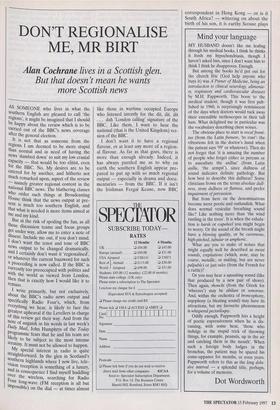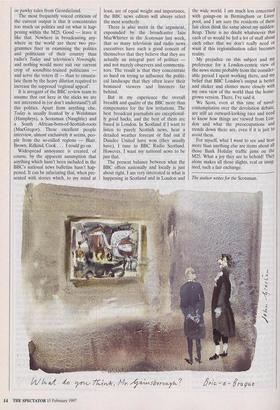DON'T REGIONALISE ME, MR BIRT
Alan Cochrane lives in a Scottish glen.
But that doesn't mean he wants more Scottish news
AS SOMEONE who lives in what the southern English are pleased to call 'the regions', it might be imagined that I should be happy about the review which is to be carried out of the BBC's news coverage after the general election. It is not that as someone from the regions I am deemed to be more stupid than normal and in need of having the news 'dumbed down' to suit my low cranial Capacity — that would be too elitist, even for the BBC. No. My desires are to be catered for by another, and hitherto not much remarked upon, aspect of the review — namely greater regional content in the national BBC news. The blathering classes who order such things at Broadcasting House think that the news output at pre- sent is much too southern English, and that what is needed is more items aimed at me and my kind. But at the risk of spoiling the fun, as all those discussion teams and focus groups get under way, allow me to enter a note of dissent. Include me out, if you don't mind. I don't want the tenor and tone of BBC news output to be changed dramatically, and I certainly don't want it 'regionalised', or whatever the current buzzword for such a proceeding is now called. If the BBC is currently too preoccupied with politics and with the world as viewed from London, then that is exactly how I would like it to remain.
I write primarily, but not exclusively, about the BBC's radio news output and specifically Radio Four's, which, from everything we hear, is likely to face the greatest upheaval if the Levellers in charge of this review get their way. And from the note of anguish in his words in last week's Daily Mail, John Humphrys of the Today programme fears that he and his team are likely to be subject to the most intense scrutiny. It must not be allowed to happen. My special interest in radio is quite straightforward. In the glen in Scotland's southern highlands where I now live, tele- vision reception is something of a luxury, and in consequence I find myself huddling over the wireless, searching for Radio Four long-wave (FM reception is all but Impossible) on the dial — at times almost like those in wartime occupied Europe who listened intently for the dit, dit, dit . . . dah 'London calling' signature of the BBC. Like them, I want to hear the national (that is the United Kingdom) ver- sion of the BBC.
I don't want it to have a regional flavour, or at least any more of a region- al flavour. As far as that goes, there is more than enough already. Indeed, it has always puzzled me as to why on earth the southern English appear pre- pared to put up with so much regional output — especially in drama and docu- mentaries — from the BBC. If it isn't the Irishman Fergal Keane, now BBC correspondent in Hong Kong — or is it South Africa? — wittering on about the birth of his son, it is earthy Scouse plays or pawky tales from Geordieland.
The most frequently voiced criticism of the current output is that it concentrates too much on politics and on what is hap- pening within the M25. Good — leave it like that. Nowhere in broadcasting any- where in the world are there two pro- grammes finer in examining the politics and politicians of their country than radio's Today and television's Newsnight, and nothing would more suit our current crop of soundbite-trained politicians and serve the voters ill — than to emascu- late them by the heavy dilution required to increase the supposed 'regional appeal'.
It is arrogant of the BBC review team to assume that out here in the sticks we are not interested in (or don't understand?) all this politics. Apart from anything else, Today is usually fronted by a Welshman (Humphrys), a Scotsman (Naughtie) and a South African-born-of-Scottish-roots (MacGregor). These excellent people interview, almost exclusively it seems, peo- ple from the so-called regions — Blair, Brown, Rifkind, Cook . . . I could go on.
Widespread annoyance is created, of course, by the apparent assumption that anything which hasn't been included in the BBC's national news bulletins hasn't hap- pened. It can be infuriating that, when pre- sented with stories which, to my mind at least, are of equal weight and importance, the BBC news editors will always select the most southerly.
There is also merit in the argument, expounded by the broadcaster Iain MacWhirter in the Scotsman last week, that so many television and radio news executives have such a good conceit of themselves that they believe that they are actually an integral part of politics and not merely observers and commenta- tors. The result is that they concentrate so hard on trying to influence the politi- cal landscape that they often leave their bemused viewers and listeners far behind.
But in my experience the overall breadth and quality of the BBC more than compensates for the few irritations. The best broadcast journalists are exceptional- ly good hacks, and the best of them are based in London. In Scotland if I want to listen to purely Scottish news, hear a detailed weather forecast or find out if Dundee United have won (they usually have), I tune to BBC Radio Scotland. However, I want my national news to be just that.
The present balance between what the BBC offers nationally and locally is just about right. I am very interested in what is happening in Scotland and in London and the wide world. I am much less concerned with goings-on in Birmingham or Liver- pool, and I am sure the residents of these fair cities think the same about my midden- heap. There is no doubt whatsoever that each of us would be fed a lot of stuff about each other that we don't really need or want if this regionalisation edict becomes reality.
My prejudice on this subject and my preference for a London-centric view of the news stems probably from the consider- able period I spent working there, and my belief that BBC London's output is better and slicker and chimes more closely with my own view of the world than the home- grown version. There, I've said it.
We Scots, even at this time of navel- contemplation over the devolution debate, are still an outward-looking race and need to know how things are viewed from Lon- don and what the preoccupations and trends down there are, even if it is just to avoid them.
For myself, what I want to see and hear more than anything else are items about all those Bank Holiday traffic jams on the M25. What a joy they are to behold! They alone makes all those slights, real or imag- ined, such a fair exchange.
The author writes for the Scotsman.



























































 Previous page
Previous page